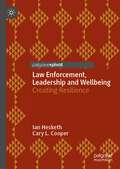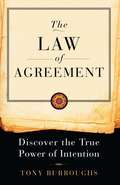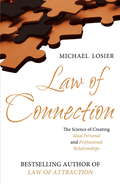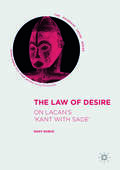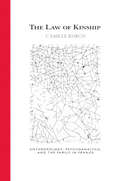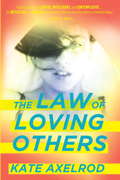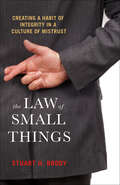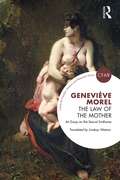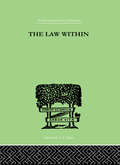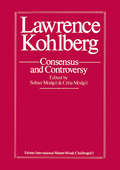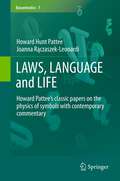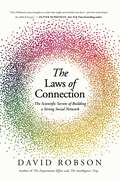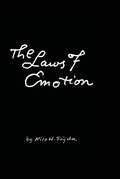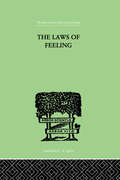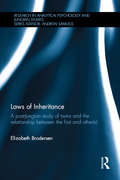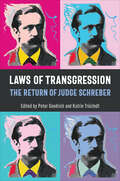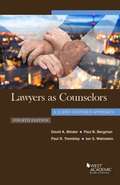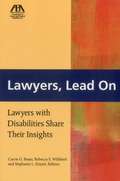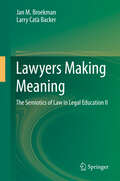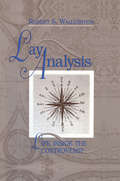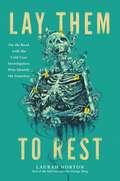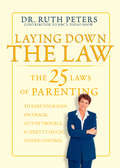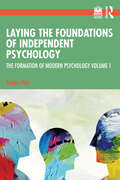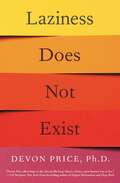- Table View
- List View
Law Enforcement, Leadership and Wellbeing: Creating Resilience
by Ian Hesketh Cary L. CooperThis book provides practical guidance on establishing wellbeing services and interventions within policing for all of those working in law enforcement, particularly leaders and HR professionals. It also offers insight, provokes thought, and gives guidance on how to navigate and get the most from working life as a police officer or member of police support staff. With a focus on the modern working environment, the book covers the key concepts, history, and practical advice necessary for all those interested in this fascinating field of law enforcement. As workplaces become ever more complex and ambiguous, and the world of work ever more dynamic, understanding how organizations behave and how those in the workplace are likely to respond is key to bringing meaning and purpose to work, the cornerstone of effective policing. The book details how to effectively measure workplace wellbeing in policing and how to interpret and use findings to make improvements and craft interventions. It is a key text for exploring law enforcement, leadership, and wellbeing within policing for all those involved with law enforcement, as well as HR professionals, occupational health professionals, and critically, those with police line management responsibilities.
The Law of Agreement: Discover the True Power of Intention
by Tony BurroughsNo matter who you are or what you believe, you have the power to manifest what you want in life--a dream job, wealth, love, and health. In this concise and fascinating book, Tony Burroughs shows readers how to work with the Law of Agreement to change old beliefs about money, relationships, and health issues that are holding them back. He shares stories from his years of working with people from all over the world who are practicing living intentionally--bringing into their lives that which serves the higher good and discarding the rest. The Law of Agreementsays that as we lend our agreement to any belief, we reinforce it and make it stronger. Alternatively, as we refrain from lending our agreement to an idea that isn't likely to give us the results we're looking for; we dilute it and weaken its power over us and over everyone else simultaneously. Burroughs offers examples and stories which show how the Law of Agreement, and its partner, the Law of Adversity work simultaneously. What happens when we don't get what we want? What is the opportunity in adversity?The Law of Agreementshows how adversity can lift us up and out of our routines and help us to reach deep inside ourselves for answers to life's hardest questions. Full of real life stories, examples, and solutions,The Law of Agreementis a practical and world-changing book.
The Law of Connection: The Science Of Creating Ideal Personal And Professional Relationships
by Michael LosierSometimes changing only a few words can make all the difference; sometimes it's more than a few words. But whatever the nature of the negative or conflicted relationship, this book will help.Have you ever felt like partners or colleagues constantly misunderstand what you are saying to them? Do you and your partner go round in circles? As the bestselling Law of Attraction showed readers how to attract what they want, Law of Connection will show you how to break the cycle and really connect with everyone in your life - at work, at home and with friends. You will learn how to enhance your communication style to really get what you want out of your relationships, so you can ensure that the ones you attract will be harmonious, productive and profitable.
The Law of Desire
by Dany NobusThis book offers the first comprehensive discussion of Lacan's Kant with Sade, an essay widely recognised as one of his most important and difficult texts. Here, the reader will find a detailed roadmap for each section of the essay, including clarifications of the allusions, implicit borrowings and references in Lacan's text, unique insights into the essay's publication history, and a critical assessment of its reception. The author expertly defines key terms, explains complex theoretical arguments, and contextualises the work within a larger philosophical discourse. No prior knowledge of Lacan, Kant or Sade is assumed, allowing both newcomers and those who are well-versed in psychoanalysis, philosophy, and literary criticism to benefit from the book. This engaging book clears the path for a long overdue re-discovery and a proper appreciation of one of Lacan's most challenging works, inspiring a renewed debate on the significance of Lacanian psychoanalysis for moral philosophy and literary theory.
The Law Of Kinship
by Camille RobcisIn France as elsewhere in recent years, legislative debates over single-parent households, same-sex unions, new reproductive technologies, transsexuality, and other challenges to long-held assumptions about the structure of family and kinship relations have been deeply divisive. What strikes many as uniquely French, however, is the extent to which many of these discussions-whether in legislative chambers, courtrooms, or the mass media-have been conducted in the frequently abstract vocabularies of anthropology and psychoanalysis. In this highly original book, Camille Robcis seeks to explain why and how academic discourses on kinship have intersected and overlapped with political debates on the family-and on the nature of French republicanism itself. She focuses on the theories of Claude Levi-Strauss and Jacques Lacan, both of whom highlighted the interdependence of the sexual and the social by positing a direct correlation between kinship and socialization. Robcis traces how their ideas gained recognition not only from French social scientists but also from legislators and politicians who relied on some of the most obscure and difficult concepts of structuralism to enact a series of laws concerning the family. Levi-Strauss and Lacan constructed the heterosexual family as a universal trope for social and psychic integration, and this understanding of the family at the root of intersubjectivity coincided with the role that the family has played in modern French law and public policy. The Law of Kinship contributes to larger conversations about the particularities of French political culture, the nature of sexual difference, and the problem of reading and interpretation in intellectual history.
The Law of Loving Others
by Kate Axelrod"Kate Axelrod's atmospheric, intense book captures perfectly the heady feeling of being on the edge of adulthood, when the abstract concept of 'love' starts to have real and sometimes terrifying meaning and consequences." - Emily Gould, author of Friendship "THE LAW OF LOVING OTHERS . . . Hours after Emma returns home from boarding school, she realizes that her mom is suffering from a schizophrenic break. Suddenly, Emma's entire childhood and identity is called into question. COULD NOT BE DISCOVERED BY REASON, Desperate for answers, Emma turns to her boyfriend, Daniel. Will he love her even if she goes crazy too? But it's the lonely, brooding boy Emma meets while visiting her mother at the hospital who really understands Emma. Phil encourages Emma's reckless need for hurt and pain in the face of all this change and she is soon caught in a complicated spiral of loss and mistrust. BECAUSE IT IS UNREASONABLE." In the span of just one winter break, Emma's relationships alter forever and she is forced to see the wisdom in a line from Anna Karenina: "The law of loving others could not be discovered by reason, because it is unreasonable." A beautifully grounded coming-of-age novel, THE LAW OF LOVING OTHERS demands that the reader accept the main character, Emma, for who she is, while also creating deep sympathy for all that she is going through.
The Law of Small Things: Creating a Habit of Integrity in a Culture of Mistrust
by Stuart H. BrodyThe Law of Small Things begins with an IQ (Integrity Quotient) test designed to reveal the casual way we regard our promises and the misconceptions we have about acting truthfully. The book shows how most people believe that integrity is something we “just have” and that we just do, like a Nike commercial. It depicts these and other deceptions we deploy to appear to act with integrity without actually doing so. The Law of Small Things also exposes how our culture encourages breaches of integrity through an array of “permitted promise-breaking,” a language of clichés that equates self-interest with duty, and the “illusion of inconsequence” that excuses small breaches with the breezy confidence that we can fulfill integrity when it counts. Brody challenges the prevailing notion that integrity is a possession you hold permanently. No one “has integrity” and no one is perfect in practicing it. What we have is the opportunity to uphold promises and fulfill duties in each situation that faces us, large and small. Integrity is a practice and a habit of keeping promises, the ones we make explicitly and the ones that are implied in all our relationships. Ultimately, developing skill in the practice of integrity leads us to knowledge of who we are--not in the way the culture defines us, but in the way we truly know ourselves to be.
The Law of the Mother: An Essay on the Sexual Sinthome (The Centre for Freudian Analysis and Research Library (CFAR))
by Geneviève MorelThe law of the mother is made up of words charged with pleasure and suffering that leave their mark on us in early childhood. In this groundbreaking book, Geneviève Morel explores whether it is possible for the child to escape subjection from this maternal law and develop their own sexual identity. <P><P>Through clinical examples and critical commentary, the book illustrates the range and power of maternal influence on the child, and how this can generate different forms of sexual ambiguity. Using a Lacanian framework which revises the classical idea of the Oedipus complex, the book is not only a major contribution to gender studies but also an invaluable aid to the clinician dealing with questions of sexual identity. The book avoids many of the moral and political prejudices that paralyse twenty-first century society, be they related to legislation on marriage, parentage or adoption, the status of "mental health", or the limits to the supposed ownership of the human body. <P><P>Insightful and revealing, The Law of the Mother will be of great interest to Lacanian psychoanalysts, as well as to researchers in the fields of gender studies and sexuality.
The Law Within (International Library Of Psychology Ser.)
by Fuller, BampfyldeFirst Published in 1999. Routledge is an imprint of Taylor & Francis, an informa company.
Lawrence Kohlberg
by Mark WoodwardFirst published in 1986. Routledge is an imprint of Taylor & Francis, an informa company.
LAWS, LANGUAGE and LIFE
by Howard Hunt Pattee Joanna Rączaszek-LeonardiHoward Pattee is a physicist who for many years has taken his own path in studying the physics of symbols, which is now a foundation for biosemiotics. By extending von Neumann's logical requirements for self-replication, to the physical requirements of symbolic instruction at the molecular level, he concludes that a form of quantum measurement is necessary for life. He explains why all non-dynamic symbolic and informational controls act as special (allosteric) constraints on dynamical systems. Pattee also points out that symbols do not exist in isolation but in coordinated symbol systems we call languages. Such insights turn out to be necessary to situate biosemiotics as an objective scientific endeavor. By proposing a way to relate quiescent symbolic constraints to dynamics, Pattee's work builds a bridge between physical, biological, and psychological models that are based on dynamical systems theory. Pattee's work awakes new interest in cognitive scientists, where his recognition of the necessary separation--the epistemic cut--between the subject and object provides a basis for a complementary third way of relating the purely symbolic, computational models of cognition and the purely dynamic, non-representational models. This selection of Pattee's papers also addresses several other fields, including hierarchy theory, artificial life, self-organization, complexity theory, and the complementary epistemologies of the physical and biological sciences.
The Laws of Connection: The Scientific Secrets of Building a Strong Social Network
by David RobsonThis groundbreaking study reveals how social connections are far more important than we thought, showing us the steps we can take to build better relationships and improve our lives.Social connection is as essential for our health and happiness as a balanced diet and regular exercise. It reduces our risk of stroke, heart disease, and Alzheimer&’s. It enhances our creativity and adds years to our life span. Yet many of us struggle to form strong and meaningful bonds—and the problem lies not with our personalities but with a series of cognitive biases that stop us from fulfilling our social potential. In The Laws of Connection, award-winning science writer David Robson describes the psychological barriers that lead us to keep others at a distance and offers evidence-based strategies to overcome them. Drawing on philosophy, neuroscience, and cutting-edge psychology, Robson introduces readers to new concepts such as the liking gap, the novelty penalty, the fast-friendship procedure, the beautiful mess effect, and the Japanese art of amae. Whether we are shy or confident, introvert or extrovert, we can all build deeper relationships. The Laws of Connection shows us how.
The Laws of Emotion
by Nico H. FrijdaThe Laws of Emotion is an accessible work that reviews much of the insightful new research on emotions conducted over the last ten years. It expands on the theory of emotions introduced in Nico Frijda’s earlier work and addresses a number of unanswered, basic problems on emotion theory. The author’s goal is to better understand the underlying psychological mechanisms of emotion. In this book, Professor Frijda also examines previously neglected topics of emotion such as determinants of emotional intensity, the duration of emotions, and sexual emotions. It touches on both evolutionary and neuroscientific explanations. The book begins by reviewing a number of principles governing emotion, or “the laws of emotion”. The author then examines the passionate nature of emotions and the motivational processes underlying them, and the nature and causes of pleasure and pain. Professor Frijda then explores the processes that lead to emotional arousal, including cognitive influences and why people care more about certain things than others. Emotional intensity is then discussed, including the often-neglected topic of the course of emotions over time. The book concludes with the author's insights into complex emotional domains such as sex, revenge, and the need to commemorate past events. The Laws of Emotion will appeal to social, cognitive, and developmental psychologists, social scientists, philosophers, and neuroscientists, as well as anyone interested in the workings of the mind. It also serves as a text for advanced courses in the psychology of emotions or the neuroscience of emotions.
The Laws Of Feeling (International Library Of Psychology Ser.)
by Paulhan, FFirst Published in 1999. Routledge is an imprint of Taylor & Francis, an informa company.
Laws of Inheritance: A post-Jungian study of twins and the relationship between the first and other(s) (Research in Analytical Psychology and Jungian Studies)
by Elizabeth BrodersenInstilled in interdisciplinary cross-cultural perspectives of mythical, socio-economic, literary, pedagogic and psychoanalytic representations, two archetypal, creative inheritance laws interact as ‘twins’: Eros (fusion/containment/safety) and Thanatos (division/separation/risk). Hypothesising these ‘twin’ laws as matrilineal (Eros) and patrilineal (Thanatos), this book explores why cross-cultural forms, including gender traits, are not fixed but are instead influenced by earlier flexible matrilineal forms. Through a study of ‘twins’ on macro and micro levels, Elizabeth Brodersen argues that a psychological ‘twin’ dilemma is implicit in inheritance laws and offers a unique forum to show how each law competes for primacy as the ‘first’ and ‘other’. Chapters begin by looking at ‘twins’ in creation myths and the historical background to the laws of inheritance, as well as literary representations. The book then moves on to the developmental structures imbued in twin research and educational systems to explore how past cultural forms have been re-defined to fit a modern landscape and the subsequent movement away from the importance of patrilineal primogeniture. Laws of Inheritance will be of key value to academics, researchers and postgraduate students in the fields of psychoanalysis, psychotherapy, archetypal theory, cross-cultural depth psychology, cultural anthropology, sociology, gender studies and twin research. The book will also be of interest to practicing psychoanalysts and psychotherapists.
Laws of Transgression: The Return of Judge Schreber
by Peter Goodrich Katrin TrüstedtLaws of Transgression offers multiple perspectives on the story of Daniel Paul Schreber (1842–1911), a chamber president of the German Supreme Court who was institutionalized after claiming God had communicated with him, desiring to make him into a woman. Schreber was not only a successful judge, but was also to become the author of one of the most commented upon texts in psychiatric literature, Memoirs of My Nervous Illness. Published in 1903, this remarkable work documented Schreber’s visions, desires, jurisprudence, and theology. Far from ending the judge’s legal investments, it manifested an intensification of engagement with the law in the attempt to prove that becoming a woman did not deprive the judge of legal competence. Schreber’s experience of bodily change and his account of interior life has been the subject of more than a century of psychoanalytic and medical scrutiny. With the contemporary trans turn, interest in the judge’s desire to become a woman has intensified. In Laws of Transgression, Peter Goodrich, Katrin Trüstedt, and contributing authors set out to unfold Schreber’s complex relation to the law. The collection revisits and rediscovers the Memoirs, not only in its juridical and political implications, but as a transgressional text that has challenged law and heteronormativity.
Lawyers As Counselors, A Client-centered Approach (Coursebook)
by David Binder Paul Bergman Paul Tremblay Ian WeinsteinPart One examines problems clients usually bring and covers the necessity of a clientcentered approach. Part Two presents the questioning and listening skills that attorneys need to gather information while encouraging active client participation. Part Three explains how to develop a story from the client's perspective, then to probe it for evidence in light of individual factual propositions; it also focuses on transactional matters, identifying the type of data lawyers need to elicit in almost all business dealings. Part Four examines the counseling process and how to help clients make decisions, which reflect their legal objectives and values.
Lawyers, Lead On: Lawyers with Disabilities Share Their Insights
by Rebecca S. Williford Carrie A. Basas Stephanie L. EnyartThis inspiring book contains letters of encouragement and advice from lawyers with disabilities to law students and new lawyers with disabilities. The writers share their perspectives on work and disability, based on their own experiences of success and setbacks.
Lawyers Making Meaning....
by Jan M. Broekman Larry Catà BackerThis book present a structure for understanding and exploring the semiotic character of law and law systems. Cultivating a deep understanding for the ways in which lawyers make meaning--the way in which they help make the world and are made, in turn by the world they create --can provide a basis for consciously engaging in the work of the law and in the production of meaning. The book first introduces the reader to the idea of semiotics in general and legal semiotics in particular, as well as to the major actors and shapers of the field, and to the heart of the matter: signs. The second part studies the development of the strains of thinking that together now define semiotics, with attention being paid to the pragmatics, psychology and language of legal semiotics. A third part examines the link between legal theory and semiotics, the practice of law, the critical legal studies movement in the USA, the semiotics of politics and structuralism. The last part of the book ties the different strands of legal semiotics together, and closely looks at semiotics in the lawyer's toolkit--such as: text, name and meaning.
Lay Analysis: Life Inside the Controversy
by Robert S. WallersteinLay Analysis: Life Inside the Controversy chronicles the history of nonmedical analysis in absorbing detail. It begins with the events of 1910 in Europe and America that initiated their divergent attitudes and policies regarding lay analysis, proceeds to the unfolding struggles over this issue on both sides of the Atlantic, and reviews the halting efforts of the APsaA, beginning in the 1950s, to reassess its opposition to lay analysis and make some provision for the training of nonmedical practitioners. Wallerstein's illuminating treatment of the response of American nonphysician therapists to the APsaA's policy - the manner in which they managed to obtain clinical psychoanalytic training despite the APsaA's prohibition - forms a fascinating story within his grand narrative. The book culminates in a comprehensive review of the lawsuit of March 1985 in which four clinical psychologists, representing a stated class of several thousand colleagues and fully supported by the American Psychological Association, brought suit against the APsaA and IPA, hoping in this way to force a change in the APsaA's policies regarding the training of lay practitioners. Wallerstein, drawing on the voluminous documentation to which he had full access - memoranda, correspondence, depositions, legal briefs, and phone conversations - reviews the three-and-a-half-year history of the lawsuit. He concludes his narrative with a measured and thoughtful assessment of the impact of the settlement on psychoanalysis today: the changes it has brought about within organized psychoanalysis and the meaning of those changes for psychoanalysis as a discipline.Given Wallerstein's comprehensive scholarship, his admirable even-handedness, and his unique participatory role in the lay analysis controversy over the course of his career, it is unsurprising that Lay Analysis: Life Inside the Controversy should achieve distinction as a major contribution to the institutional history of psychoanalysis.
Lay Them to Rest: On the Road with the Cold Case Investigators Who Identify the Nameless
by Laurah NortonTake a fascinating deep dive into the dark world of forensic science as experts team up to solve the identity of an unknown woman by exploring the rapidly evolving techniques being used to break the most notorious cold cases. Fans of true crime shows like CSI, NCIS, Criminal Minds, and Law and Order know that when it comes to &“getting the bad guy&” behind bars, your best chance of success boils down to the strength of your evidence—and the forensic science used to obtain it. Beyond the silver screen, forensic science has been used for decades to help solve even the most tough-to-crack cases. In 2018, the accused Golden State Killer, Joseph DeAngelo, was finally apprehended after a decades-long investigation thanks to a very recent technique called forensic genealogy, which has since led to the closure of hundreds of cold cases, bringing long-awaited justice to victims and families alike. But when it comes to solving these incredibly difficult cases, forensic genealogy is just the tip of the iceberg—and many readers have no idea just how far down that iceberg goes. For Laurah Norton, forensic science was always more of a passion than anything else. But after learning about a mishandled 1990s cold case involving missing twins, she was spurred to action, eventually creating a massively popular podcast and building a platform that helped bring widespread attention and resources to the case. LAY THEM TO REST builds on Laurah&’s fascination with these investigations, introducing readers to the history and evolution of forensic science, from the death masks used in Ancient Rome to the 3-D facial reconstruction technology used today. Incorporating the stories of real-life John & Jane Does from around the world, Laurah also examines how changing identification methods have helped solve the most iconic cold cases. Along the way readers will also get to see Laurah solve a case in real time with forensic anthropologist Dr. Amy Michael, as they try to determine the identity of &“Ina&” Jane Doe, a woman whose head was found in a brush in an Illinois park in 1993. More than just a chronicle of the history of forensics, LAY THEM TO REST is also a celebration of the growing field of experts, forensic artists, and anthropologists (many of whom Laurah talks to in the book), who work tirelessly to bring closure to these unsolved cases. And of course, this book asks why some cases go unsolved, highlighting the &“missing missing,&” the sex workers, undocumented, the cases that so desperately need our attention, but so rarely get it. Engrossing, informative, heartbreaking, and hopeful, LAY THEM TO REST is a deep dive into the world of forensic science, showing readers how far we&’ve come in cracking cases and catching killers, and illuminating just how far we have yet to go.
Laying Down the Law: The 25 Laws of Parenting to Keep Your Kids on Track, Out of Trouble, and (Pretty Much) Under Control
by Ruth PetersLaying Down the Law presents 25 no-nonsense rules that teach your kids values and discipline from the inside out NBC Today show expert Dr. Ruth Peters shares her best and newest advice for helping families restore order and keep the peace with proven, painless methods that once and for all get your children to: * Understand and follow your family's values * Do their work when and how YOU want it done--without whining* Follow your rules, even when their friends don't * Develop compassion and empathy Now, you'll know: * When snooping in their rooms is okay--and how to do it * When making peace is the WORST thing you can do * The 5 questions you must ask your teenager every time he leaves the house * Why your kids should earn their privileges--and how to get them to
Laying the Foundations of Independent Psychology: The Formation of Modern Psychology Volume 1 (The Formation of Modern Psychology)
by Csaba PléhPart of a two-volume series, this book offers a multicentric perspective on the history of psychology, situating its development in relation to developments made in other social sciences and philosophical disciplines. This first volume, Laying the Foundations of Independent Psychology, provides a detailed exploration of the origins and development of European psychology. The book examines psychology’s beginnings as an independent discipline in the late 19th century through to the emergence of the dominant new schools of behaviorism, Gestalt psychology and psychoanalysis in the early 1900s. This volume also offers a broad overview of the early impact of Darwinism, not only on the psychological study of individual differences and on American functionalism, but also on the early evolutionary treatments of cognition in William James, James Baldwin, Ernst Mach and even Sigmund Freud. Taking this wider perspective, the book shows that European psychology was continuously present and active, placing these European developments in their own context in their own time. An invaluable introductory text for undergraduate students of the history of psychology, the book will also appeal to postgraduates, academics and those interested in psychology or the history of science, as well as graduate students of psychology, biology, sociology and anthropology with a theoretical interest.
Laziness Does Not Exist
by Devon Price Ph.D.From social psychologist Dr. Devon Price, a fascinating and thorough examination of what they call the &“laziness lie&”—which falsely tells us we are not working or learning hard enough—filled with practical and accessible advice for overcoming society&’s pressure to &“do more.&” Extra-curricular activities. Honors classes. 60-hour work weeks. Side hustles. Like many Americans, Dr. Devon Price believed that productivity was the best way to measure self-worth. Price was an overachiever from the start, graduating from both college and graduate school early, but that success came at a cost. After Price was diagnosed with a severe case of anemia and heart complications from overexertion, they were forced to examine the darker side of all this productivity. Laziness Does Not Exist explores the psychological underpinnings of the &“laziness lie,&” including its origins from the Puritans and how it has continued to proliferate as digital work tools have blurred the boundaries between work and life. Using in-depth research, Price explains that people today do far more work than nearly any other humans in history yet most of us often still feel we are not doing enough. Dr. Price offers science-based reassurances that productivity does not determine a person&’s worth and suggests that the solution to problems of overwork and stress lie in resisting the pressure to do more and instead learn to embrace doing enough. Featuring interviews with researchers, consultants, and experiences from real people drowning in too much work, Laziness Does Not Exist encourages us to let go of guilt and become more attuned to our own limitations and needs and resist the pressure to meet outdated societal expectations.
Lazos de amor
by Brian L. WeissPedro y Elisabeth no se conocían, y nada indicaba que hubiera entre ellos la menor afinidad, salvo que ambos eran jóvenes y que la infelicidad que nublaba su vida los había llevado a ponerse en manos del mismo psiquiatra. Esta circunstancia en apariencia casual no tardó en revelarse como una estratagema del destino. El doctor Weiss, autor de "Muchas vidas, muchos maestros" y "A través del tiempo", supo intuir que Pedro y Elisabeth estaban ligados indisolubremente. Fueron necesarias muchas sesiones -siempre bajo hipnosis- y el entusiasmo de un médico capaz de transgredir los dogmas de la ciencia al uso, para que ambos recuperaran la memoria de anteriores reencarnaciones y descubrieran los lazos que los unían más allá del tiempo.
